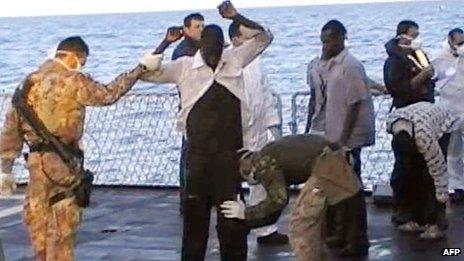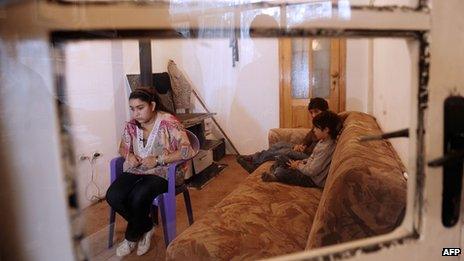Europe's discontent
- Published
- comments

Hostility to EU migrants seems to have become entrenched in the bloc's biggest economies
The election campaign for the European Parliament has begun. It is not that hopeful candidates are already making their pitches to the voters, but the political battleground for next May's contest is being shaped.
The elections will be fought against a background of Europe's discontent. That was underlined yet again at the weekend when a poll for the Financial Times, external found that "hostility to EU migrants seeking work and benefits is now entrenched in the bloc's biggest economies".
And on the question of whether the EU would do better with fewer powers, two-thirds of Britons agreed but, more surprisingly, so did half of Germans and nearly half of Spanish voters.
A few weeks ago, a poll for Debating Europe found a majority of Europeans believe that the austerity measures pursued since the start of the crisis have failed.
A few months earlier, the Pew Institute discovered that approval ratings for the EU and its institutions have fallen sharply - in almost every country except Germany. In France, only 41% had a favourable view of the EU, which was less than the UK.
The political consensus behind the European project is fracturing. It is quite possible that come next May, 170 MEPs out of a total of 751 will be broadly questioning of or even hostile towards the European establishment.
The main reason for Europe's discontent is the economy. Even though the acute phase of the eurozone crisis has passed, next year, three of the five largest economies in Europe, according to the IMF, will register tepid growth at best.
"Europe's leaders are currently in a race against time, hoping that economic conditions will improve fast enough before an anti-reform and anti-EU backlash undermines the whole single currency project," says Nicholas Spiro of Spiro Sovereign Strategy.
But economic insecurity is fuelling unease over immigration and migration between EU countries. Anti-establishment parties are tapping into this wider disquiet and voters no longer necessarily believe the Commission's interpretation of figures.
Unpopular compromise

Leonarda Dibrani was detained whilst on a school trip in France and later deported to Kosovo
The political sensitivity of all this was in full display at the weekend in France, with the government and the president twisting and turning over the case of 15-year-old Leonarda Dibrani.
She had been detained whilst on a school trip and later deported to Kosovo after her family had failed to win asylum. The expulsion of Leonarda had brought "les jeunes" (the youth) on to the streets in protest.
French President Francois Hollande, facing pressure from all sides, came up with a formula that satisfied almost no-one. He said that Leonarda could return to school in eastern France on the condition she come back alone without her family.
The president was accused of splitting families, but instant polls revealed that two-thirds of the French public do not want Leonarda to return. The government, in taking a robust stance, is aware of the growing support for the right-wing National Front.
Much attention has recently been focused on the tragic journeys of migrants crossing from Africa to the Italian island of Lampedusa. My colleagues have been monitoring the speed with which arrivals now move through Europe.
In Italy, where they are supposed to be processed, many are allowed to travel north without having been fingerprinted and without documents.
Rules are bent or ignored in the hope that migrants will move north to places like Sweden where they will get a better welcome. The aim is to make the new arrivals disappear off the news agendas as soon as possible.
Turn back the page?
Polls suggest deep disapproval of Romanian and Bulgarian citizens being able from next January to work in any member state and yet that is one of the EU's main freedoms.
In a thoughtful essay on the European elections for the Centre for European Reform, external, Heather Grabbe and Stefan Lehne recognise that the European Parliament is still not "accepted as an essential party of the body politic".
They understand the call for democratic legitimacy, but do not believe the answer lies in allowing the parliament's political groupings to essentially nominate the next head of the European Commission.
They argue that not only could it lead to a partisan president, but that it will not cut much ice with the voters.
They suggest the election campaign should focus on what the EU has done well, the single market, freedom to travel, etc. They would like to see the argument of the anti-establishment parties confronted head-on.
"The reality is that there is no going back to autonomous national policies for the economy or migration," the authors say.
They want to remind voters that "going back" would lead to higher prices and make travel more difficult.
So the battleground is being prepared. The European establishment is determined to make the election about the future of Europe. They will ask voters to decide whether they want to turn back the page and to sacrifice what has been achieved.
Ranged against them will be parties who will argue that austerity has led to mass poverty in southern Europe, that budgets and policies are being set by remote masters and that Brussels is insensitive to fears about migration and immigration.
The months ahead will see fierce debates about the future of the European project.